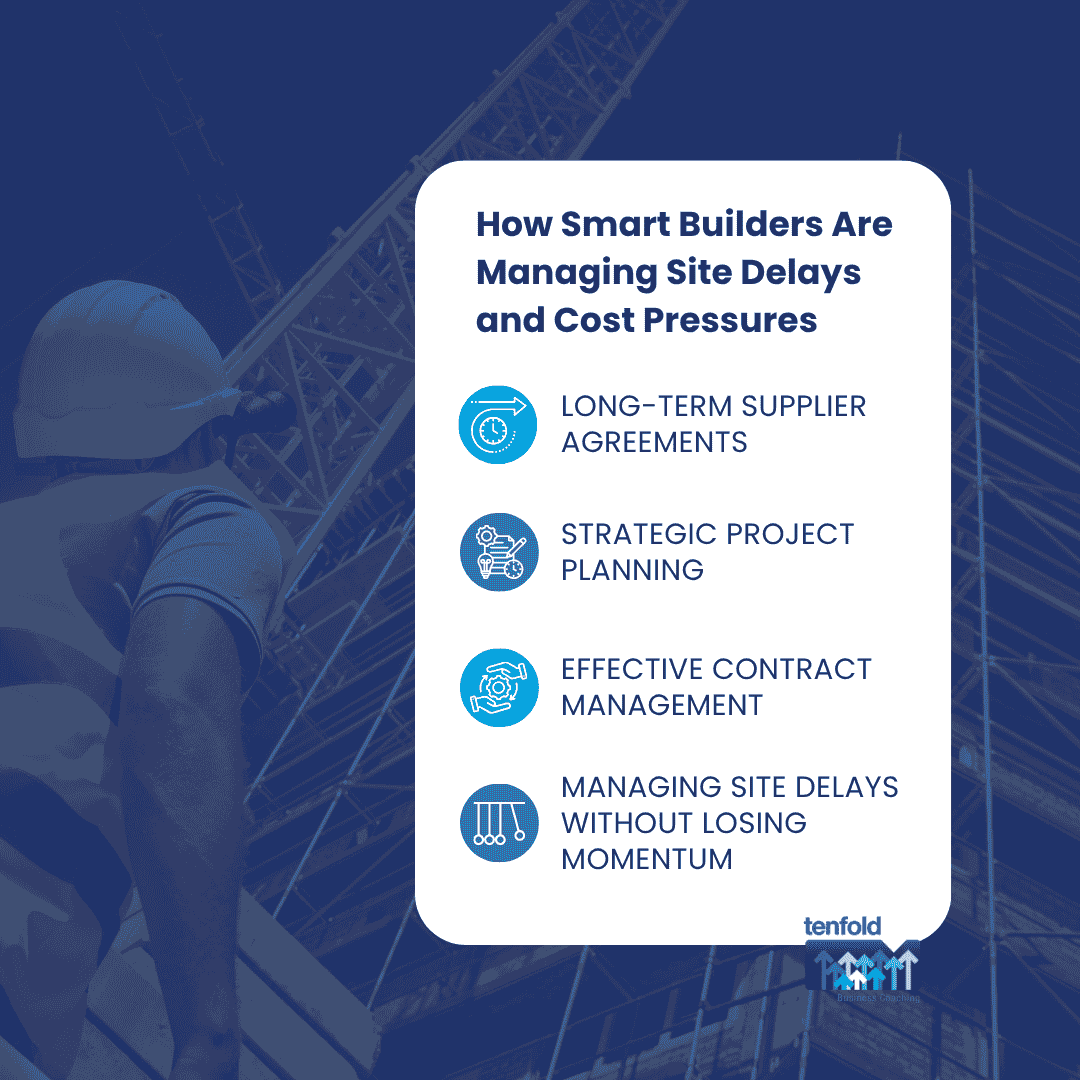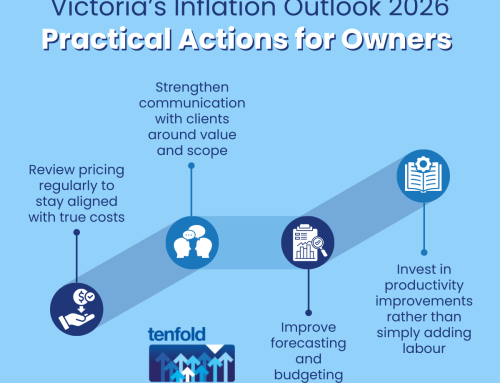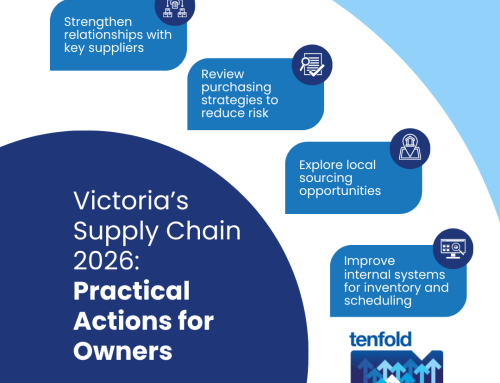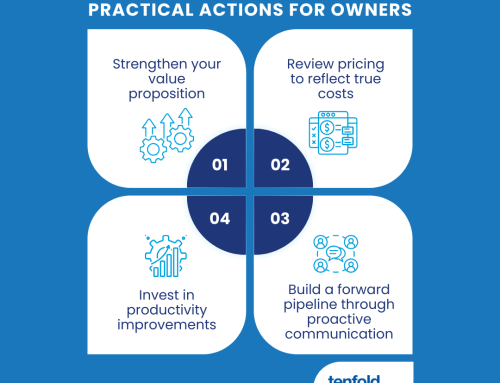Construction Work Is Booming in Victoria – Here’s How Smart Builders Are Managing Site Delays and Cost Pressures
Victoria’s construction industry is booming, with demand stronger than ever. The latest market forecasts indicate a significant increase in new home builds and infrastructure projects, fueled by population growth and anticipated interest rate cuts. For established residential builders, this boom presents both opportunities and challenges. Rising costs, supply chain disruptions, and unpredictable site delays can jeopardise profitability if not managed effectively.
Smart builders recognise that success isn’t just about meeting demand, it’s about exercising control. Whether it’s negotiating with suppliers, addressing labour shortages, or managing price volatility, the best builders in the industry are taking proactive measures to protect their projects and maximise their margins.
I’m Ashley Thomson, a construction business coach and I head up our business coaching firm in Melbourne, with decades of experience assisting construction businesses in scaling sustainably. My background in business engineering and strategic growth coaching has provided me with firsthand insight into what distinguishes thriving builders from those grappling with inefficiencies. Having mentored business owners of leading construction firms across Australia, I know the strategies that work, and I’m here to share them with you.
The Financial Challenges Confronting Victorian Builders in 2025
The construction boom occurring across Victoria presents an exciting prospect for many in the industry, yet it also brings significant financial challenges that builders must navigate. As they strive to meet the rising demand for housing and commercial buildings, builders are confronting numerous cost pressures. Increasing material costs have become commonplace, affecting everything from timber to steel, while ongoing labour shortages make it difficult to find skilled workers. This shortage not only impacts project timelines but can also result in higher wages and costs to attract the necessary talent.
Additionally, new compliance requirements introduced by government regulations are adding layers of complexity to construction projects, making it essential for builders to remain informed and adaptable. These factors contribute to an unpredictable financial landscape, with economic forecasts indicating that construction costs will continue to experience volatility in the near future. Many builders are struggling with cash flow challenges as they navigate the fluctuations in supplier prices, resulting in difficulties in maintaining profitability.
In light of these challenges, successful builders understand the importance of being proactive rather than simply waiting for these cost pressures to ease. They actively manage their pricing strategies to ensure they can sustain their operations during harsh economic conditions. This may involve renegotiating contracts, exploring bulk purchasing options, or even re-evaluating their business models to remain competitive in an ever-changing market. By staying ahead of the curve, builders can not only weather the storm of rising costs but also position themselves for long-term success in a dynamic industry.
Long-term Supplier Agreements
In the competitive landscape of construction, astute builders in Australia are increasingly recognising the value of long-term supplier agreements over merely relying on short-term price quotes. By negotiating locked-in rates and establishing bulk purchase agreements with their suppliers, these builders can safeguard their profit margins against the volatility of market prices. This proactive approach not only offers financial stability but also ensures a greater level of predictability in project costs and timelines.
Additionally, long-term partnerships with suppliers can strengthen relationships, which may lead to potential discounts and preferential treatment in terms of availability or delivery schedules. These strategic arrangements allow builders to manage their budgets more efficiently and mitigate risks associated with sudden price increases or supply shortages, ensuring projects remain on schedule and within budget. By adopting a proactive approach in their procurement strategies, builders can set themselves up for greater long-term success.
Strategic Project Planning
Builders who possess a thorough understanding of their financial position and anticipated workload are in a far better position to prioritise high-margin projects. By doing so, they ensure they are not taking on jobs that may expose them to excessive cost risks. This insight allows builders to strategically allocate resources, making informed decisions about which projects to embark on, ultimately enhancing their profitability and stabilising their financial future.
Furthermore, by focusing on high-margin opportunities, builders can mitigate the uncertainty associated with fluctuating market conditions and avoid overexposure to less profitable ventures. In an industry where margins can often be tight, having a clear grasp of one’s financial health and upcoming workload is vital for long-term success and sustainability in the construction sector.
Effective Contract Management
In the construction industry, effective contract management is crucial for maintaining profitability and ensuring project success. Savvy builders in Australia recognise the importance of adapting to the ever-changing landscape of material costs, which can fluctuate unexpectedly due to various factors like market demand, supply chain disruptions, and global economic conditions. To safeguard their interests and manage their budgets effectively, they incorporate specific clauses within their contracts that allow for cost adjustments in response to these price variations. These clauses not only provide a safety net for builders but also foster transparency in client relationships. By clearly outlining how adjustments will be handled, builders can mitigate disputes and maintain trust with stakeholders. It is important for builders to review these clauses regularly and stay informed about market trends, ensuring they are prepared to negotiate terms that reflect the current economic realities.
Moreover, employing effective contract management tools and strategies can help builders track changes and implement adjustments smoothly, ultimately leading to more successful and sustainable project outcomes.
Managing Site Delays Without Losing Momentum
Delays are an unavoidable aspect of the construction industry, but how a builder navigates these challenges is crucial for shaping both profitability and client satisfaction. Various unforeseen site issues can arise, ranging from unpredictable weather patterns (such as heavy rain or extreme heat) to material shortages caused by global supply chain disruptions. Even the most meticulously planned projects can experience setbacks if builders are not fully prepared to handle such scenarios.
Experienced builders mitigate the impact of delays by refining their scheduling and communication strategies to a fine art. One particularly effective approach is to buffer critical timelines. This involves incorporating a safety net within project schedules, which ensures that contingencies are in place to account for any delayed deliveries or unexpected labour shortages. Builders who implement such robust systems are better equipped to avoid last-minute scrambles and minimise downtime; they proactively align trades and suppliers, thereby streamlining the entire construction process.
In addition to scheduling, effective workforce management is vital. Builders who prioritise and cultivate strong relationships with their subcontractors and employees tend to keep their projects running smoothly. By ensuring reliability within their teams, these builders greatly enhance their ability to meet deadlines. Furthermore, those who invest in well-organised scheduling tools, emphasise proactive site management practices, and encourage clear, ongoing communication among their teams often experience fewer productivity bottlenecks. In an industry where time is money, these strategies not only boost efficiency but also foster a greater sense of cohesion among all parties involved in the construction process. Ultimately, the ability to manage delays effectively can distinguish successful builders from the competition and lead to stronger client relationships.
Why Strong Leadership and Business Strategy Matter More Than Ever
A construction business’s success isn’t just about technical expertise. It’s about leadership. In uncertain market conditions, business owners must embrace the role of strategic decision-makers. This means refining financial forecasting, empowering their teams with structured processes, and building resilience into their operations.
At Tenfold Business Coaching, we work with builders across Australia to help them sharpen their business strategies and position their companies for growth. Whether it’s refining pricing models, improving staff retention, or navigating compliance challenges, the right guidance from a construction business coach ensures that builders thrive, not just survive, the pressures of the industry.
If your construction business is growing and you want to ensure you’re building on a strong foundation, now is the time to optimise your operations. The smartest builders aren’t just responding to market conditions. They’re shaping their own success. Contact a business coach Melbourne to learn how we can help you optimise your operations and build a thriving business.






